The search for THE Soul Syndicate, Inc behind the gem of a two-sider 45 instantly became an obsession with many false leads – including a deep dive down an entirely different rabbit hole, but we will save that for another day. In the meantime, it is a true pleasure to celebrate a band that is (at least in my mind) under-appreciated. Man alive, these guys… Enjoy! [2021 Shawn Chambers / Lexingtunes]
A framed record hangs on the wall of a Mt Sterling diner – almost unnoticed among the other local treasures all vying for space and attention. Time and sun have faded the label. The black grooves silenced behind glass. To some it is just another obscure memento from a half century ago. To others it is a reminder of when soul music blasted across the town and of a band never to be forgotten – the Soul Syndicate, Inc.
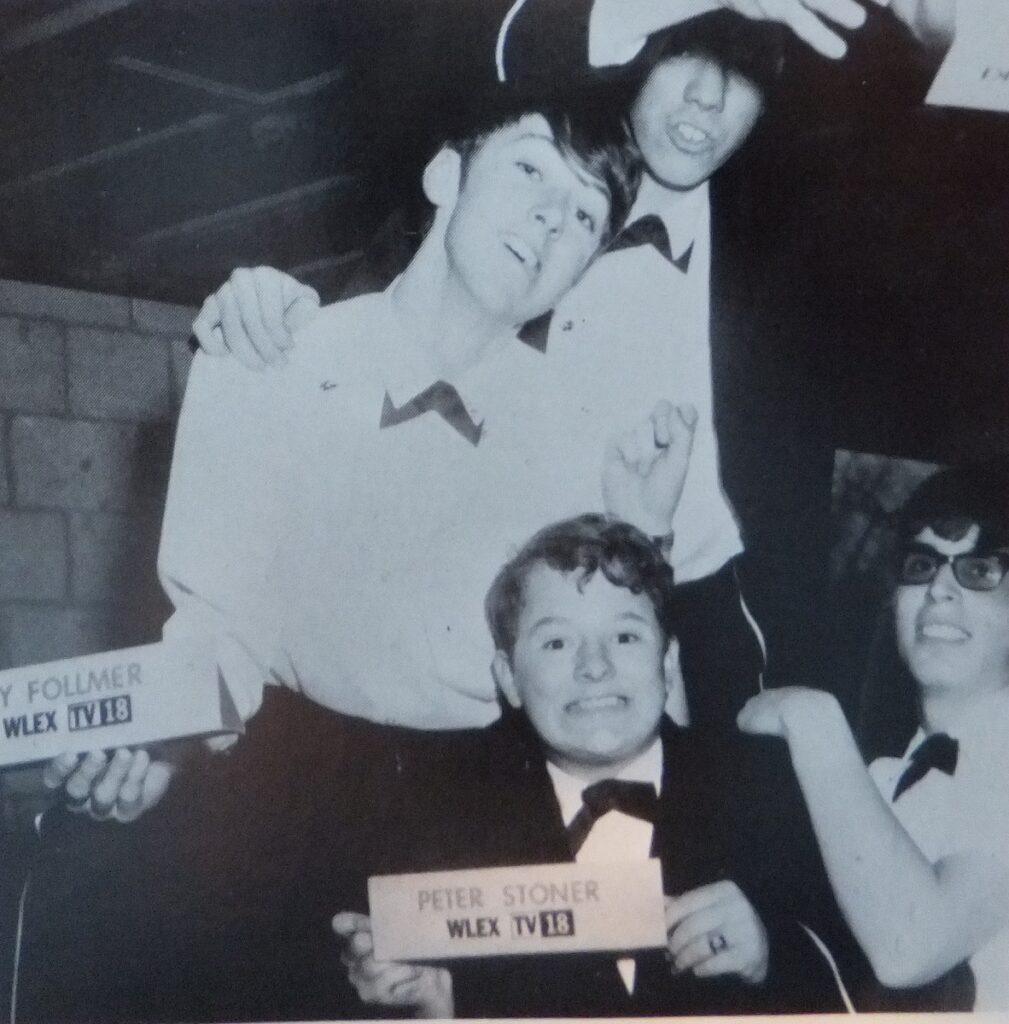
The birth of the band seems to have been late 1967 as it was during the summer of that year that Bob Unger moved to Mt Sterling from Ohio. He joined the high school band on clarinet where he met David Lane (drums), Ed Miller (trumpet), and Jim Malone (trombone) as well as sax player Mike Rosenberg. Besides his clarinet, Unger had rolled into Kentucky with a knockoff Fender bass and once he learned Malone was also a guitarist the ball was rolling.
David’s parents already tolerated his drum kit in the basement so the Lane household became the de facto practice space early on. Unger normally handled the lead vocal and the boys learned a smattering of tunes quickly. The sax, however, just wasn’t working and Rosenberg was let go. The name adopted for this earliest effort was the 25th Hour, which was possibly taken from the Anthony Quinn film from earlier that same year.
They found a replacement for Rosenberg in James Tripp and his Farfisa changed the sonic direction of the band, but the biggest change was the further addition of Norman “Cookie” Asberry. A couple of years older than the others, Cookie was also a member of the high school band on drums and it is likely there that Malone or someone heard him belt a verse or two and convinced him to join their group. The addition of Cookie on lead vocal created an entirely new atmosphere and the barely used 25th Hour name was dropped in favor of the Soul Syndicate, Inc.
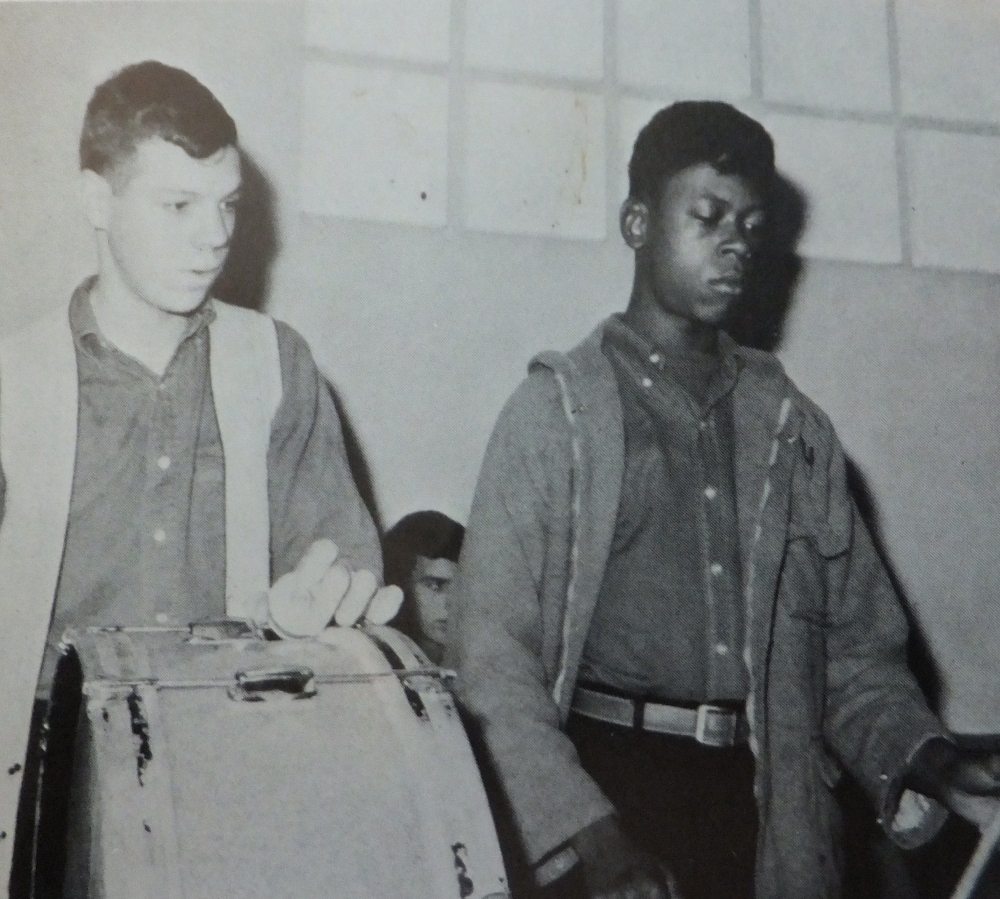
The boys smartly tacked on “Inc.” in an attempt to differentiate themselves from other Soul Syndicate groups. Indeed, at that time there was one Soul Syndicate working in far western Kentucky and much closer to home (but completely unrelated) was Lexington’s Soul Syndicate who had residence at the popular Paradise Inn nightclub.
The full lineup was almost complete and it would be the addition of a second trumpet in Tom Cannon that cemented the deal in 1968. The exact time and circumstances of Cannon joining are hazy, but it was either to bolster the sound or because of a football injury to the mouth of Ed Miller that had limited his playing for a time and one that would continue to trouble him for the duration of his band days. Either way, it was a smart move as the cherubic Cannon was first chair on trumpet and had been playing since the third grade.
Besides the commitment to the Syndicate and the high school band for most of them, the trio of Malone, Miller, and Unger were also members of the football team with David Lane also involved as a trainer/manager. Time management was essential to hit all the various practices, but teen boys have a way of being everywhere at once. Through the months the Syndicate didn’t just survive, but thrived.
Tripp’s family offered up a barn/large workshop for practice outside of town. The less restrictive space freed them and in short order they were running the gamut of gigs around the region: school sock hops, fraternity parties, American Legion halls, some surprisingly wild Jaycees events, the local country club, block parties, political events and even in later years some shows at the infamous Cozy Corner.
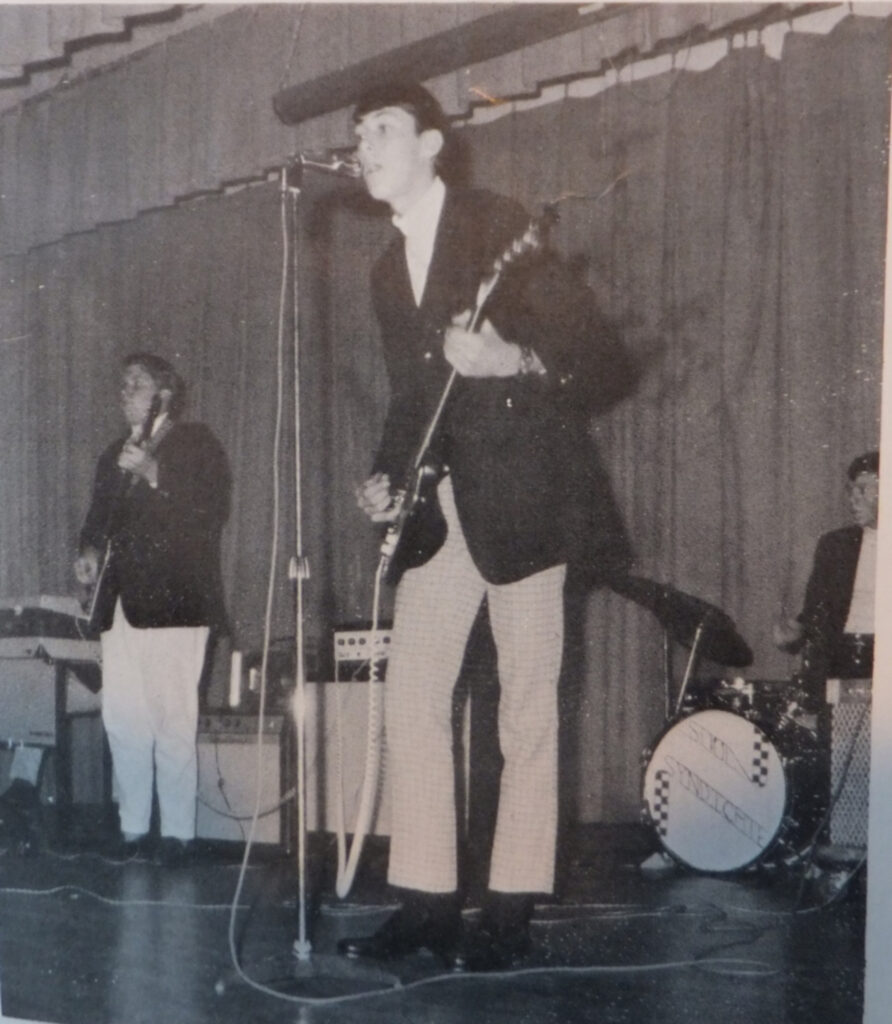
Despite Mt Sterling’s heel dragging when it came to school integration (hastened by the 1964 arson fire at the African American DuBois School), the band found no prejudice against them at their shows. Indeed, the charismatic Cookie possibly opened up venues to them that may have been more difficult without him out front. Of course, anyone would have thought twice about rabble rousing with broad-chested tackle/guitarist Malone and the other gridiron hardened band members ready to back any play.
The shows were lively feel-good affairs with standards commonly culled from the catalogs of Wilson Picket, Sam and Dave, Archie Bell, Otis Redding, and Percy Sledge with the addition of some less obvious choices like the Winstons “Color Him Father” added to the mix.
As their experience grew so did the increase in their asking price (up to $300 – $400 for a premium spot) and this coupled with some of them bucking bales, delivering papers, or cutting grass the fellas were able to upgrade their equipment and their look. The early days of repurposing the tuxedo leg trousers and loose shirts from their band uniforms gave way to a matching set of shiny metallic green pullovers picked up at a Lexington specialty shop that had been on Cookie’s radar.
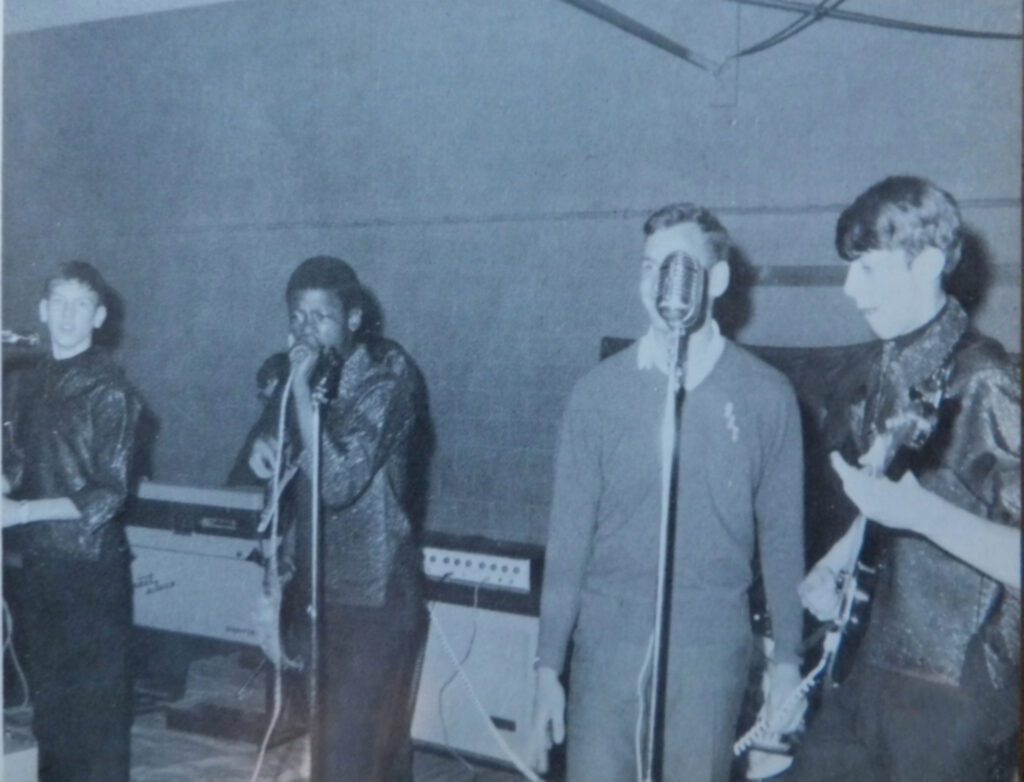
They had the gear. They had the look. Most importantly, they had the SOUND! Their popularity was on the rise and the next logical step was to have it all on record.
When it came time to seek out a studio the boys did their research and opted to audition Sambo Recording Studio in Jeffersontown. The train ride from Mt Sterling to Louisville for a scouting proved fruitful as the band was impressed by Ray Allen and Hardy Martin’s setup and experience. A price of around $500 was agreed upon with 500 singles to be pressed and Sambo’s publishing imprint of Falls City to get the rights to any original material. A return visit was scheduled.
On recording day, the drive over was spent frantically working out the last-minute arrangement changes to their original song, which had not been nearly as polished in live performances as much as the Barbara Lynn cut they intended for the flip-side.
At Sambo, the band was introduced to Wayne Young who would be handling the production work. Young, of course, was the guitarist for Louisville’s legendary Soul, Inc. Despite the great studio and in-house talent, the session was not without some issues due to nerves or otherwise. Malone was having some minor problems with his guitar pickup and Tripp was seemingly unable to lay off his volume pedal much to the consternation of his bandmates. Add in some overdubs of the horns and backing vocal and getting these two cuts in the can was a most-of-the-day affair.
The Syndicate meant business and were not afraid to pop their original composition on Side One and leave the cover for the flip. To the uninitiated the simple opening with a bit of jangly guitar from Jim leads into a beat from Lane that could have the cut heading in any number of directions; however, once Cookie drops his best Redding-esque delivery over the break-in organ it is obvious the destination is Soul Town.
If you don’t like my apples
Don’t shake my tree
I’m not after your woman
She is after me
If you want your woman
You better keep her by your side
Because if she flags my train
I’m surely gonna give her a ride
Despite his offering of some solid lyrical advice on how to “Keep Your Woman”, Cookie’s seductive growl will end up winning over your gal no matter what you do! Clocking in at four minutes there is plenty of time for some triumphant trumpetry and a simple organ solo from Tripp. The original song comes full circle and wraps with a nice bit of guitar from Malone.
The flipside cover of “This Is The Thanks I Get” is a great treatment of the Barbara Lynn track. While her original comes in with a simple cross-stick drum and sparse arrangement, the Syndicate opt for keys and tight horns from Cannon and Miller right from the start. Cookie keeps it soulful and as the song give way to a bit of guitar it is so easy to visualize the boys hitting this live on stage with synchronized movements and some nice soaring backing vocals over a shared mic with Unger in particular reaching towards the heavens Motown-style.
On the heels of the record’s release, the Syndicate opted to hire Tony Warren as their business manager to up their professionalism and obviously to gain help with promotion. Warren was a former WMST dee-jay and had experience booking some of the Triangle Talent bands out of Louisville as well as occasionally arranging local shows for national acts like the Contours of “Do You Love Me” fame.
He got right to work.
The record was distributed to various record shops like Barney Miller’s in Lexington and Sharp’s in Mt Sterling as well as pushed to radio stations. It was, of course, featured on WMST, but was also apparently spun on WAKY and probably WLAP amongst others. No weekly local radio surveys could be verified, but there are rumors of the boys hitting the top 20 of local charts in the Cincinnati market and elsewhere.
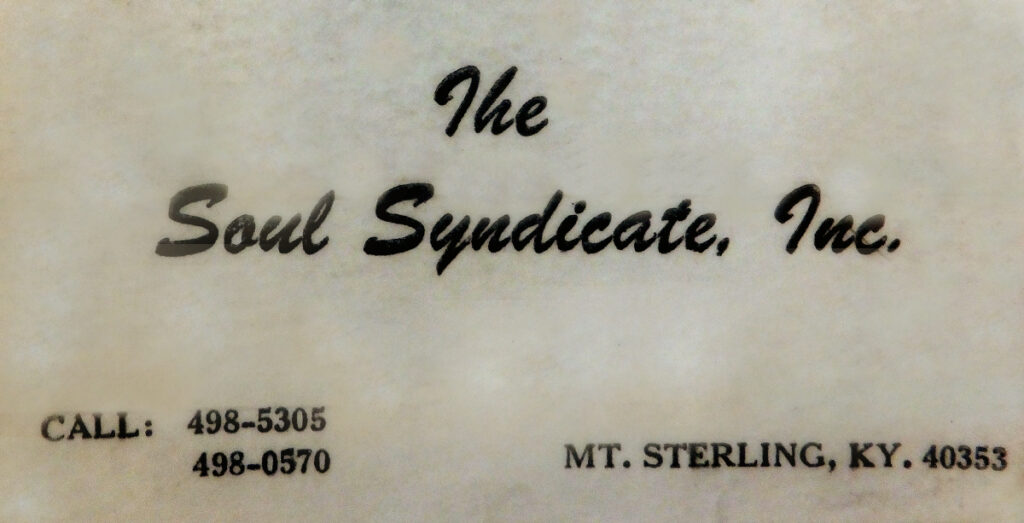
Warren didn’t stop with radio and arranged for an interview and band appearance on the very popular Lexington program “Town Talk” with June Rollings and Ted Grizzard on WKYT Channel 27. This was tricky since the entire band save Cookie was supposed to be in school. Trumpet player Ed Miller’s father was the Superintendent of the school system in Montgomery County and it fell on Warren to convince the senior Miller to allow the boys to cut school for the appearance. His charm worked as the boys made the day trip to Lexington and did a lip sync (per Malone) to both songs in the studio. Unger recalls:
It was all I could do to keep from laughing. The camera man didn’t have a clue and kept filming the wrong musician during the songs but we got through it fine.
Despite these successes not everyone in the band was as enthusiastic. Tripp in particular had a hard time letting go of his perceived control over several aspects of the band. He had fronted money initially for the PA system as well as provided the practice space on the farm and he had used this as leverage to have input in many of the band workings since joining. Things came to a head and Tripp was dismissed, but it would not be the last of his musical ventures in Mt Sterling.
Coupled with the band work was the coming football season, which always added a layer of difficulty to timing practices and shows. Friday night lights meant the stadium and not the stage. Coach Ishmael’s squad was rumored to be even better than the ’67 team that had gone to the state final only to be defeated by Bardstown. The Trojans proved all the rumors true and on November 28, 1969 at Stoll Field in Lexington they exacted revenge on Bardstown behind three touchdown passes from QB Miller to claim the Class A State Championship.
With football season safely behind them, the band was once more the primary focus, but there were more changes coming. Memories and timelines vary as to when or why he left, but ultimately there was a David Lane vacancy on drums and Robert Hayes became the replacement.
Manager Warren continued to tighten practices and worked to improve band conditions. Previous appearances had been made in separate cars or the occasional loaner van from Lane’s father who operated a Ford dealership in town, but now Warren found a new solution in an old ’65 Ford Econoline ex-dry cleaner van for sale in nearby Owingsville. He enlisted local country music legend and Mt Sterling sign-painter Lyle Stone to boldly embellish the sides with “The Soul Syndicate, Inc” and it became the boys’ “new” tour vehicle and delivered them in style anywhere a soul fix was needed.
The smaller unit would continue, but the ultimate blow was yet to come — Cookie Asberry was drafted.
As with many bands the Soul Syndicate, Inc. was much greater than the sum of its parts, but by all accounts, Cookie really was the soul of the Syndicate. On his departure the band tried a new lead singer (Dempsey Blanton?) and ran through a series of random brass additions including possibly trumpeter Ted Marye (later of the 25th Hour), but the same magic could not be replicated. The final blow was just the passing of time. Except for the younger Tom Cannon the boys all graduated in 1970 and shipped off to colleges that Fall and there was no way logistically to continue.
As the years rolled, the original members made at least one sincere attempt to have a reunion show and reached out to Cookie, but he was not at a point in his life that he could make the commitment to be in Kentucky and the whole deal fell through. There was a nearly full reunion in the early 80s with only David Lane unable to attend (but literally cut/pasted into the photo by Malone), but it would be the last time the band was ever that fully assembled.
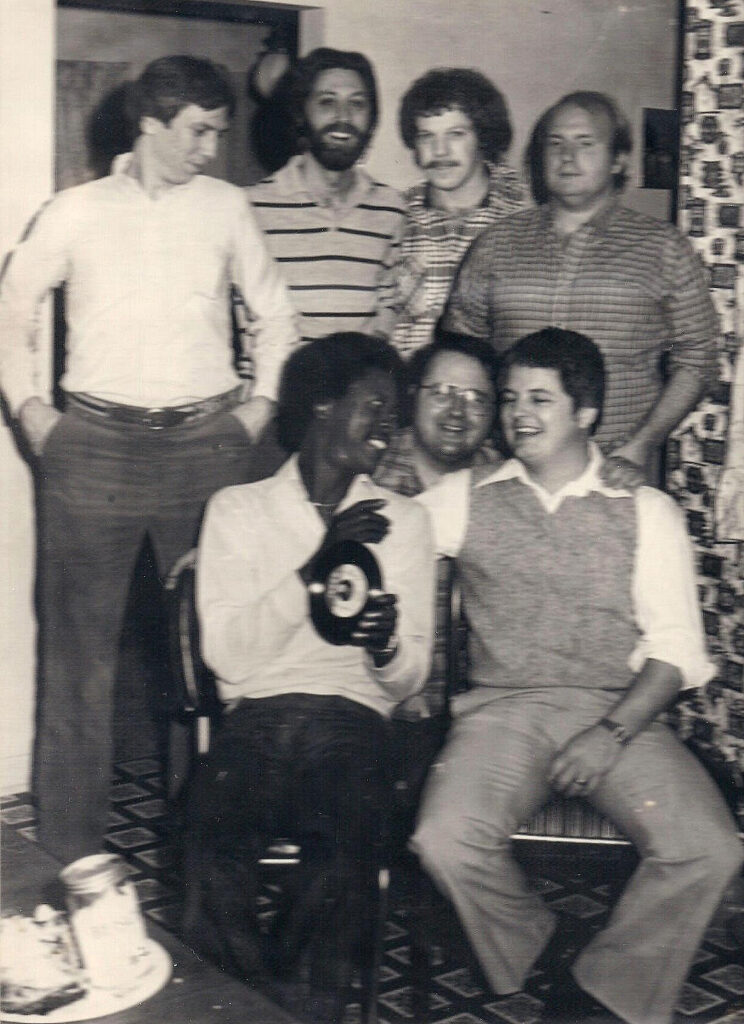
Norman Asberry was shipped to California’s Camp Roberts in 1970. He served time at a Korean base before landing back stateside where he wed the lovely Ladwiena in 1974. Dubbed “Fox” during his time in the Army, Asberry acted as a drill sergeant and ended up as a recruiter during his final years of enlistment. The couple had relocated with the military to South Carolina and Oklahoma before returning to California where they raised three daughters – at least one of whom seems to be carrying on the tradition as a vocalist. Asberry opened a record store briefly in Paso Robles but it closed after a couple of years. He did play and sing with various people casually, but seemed unable or disinterested in getting any serious musical project together. He died in 1996 at only 46 years old.
Tom Cannon graduated in 1971 and headed to Western Kentucky University before returning to Mt Sterling. He continued playing music as part of a country duo (the Helton-Cannon band) for roughly twenty years in the 80s and 90s. His trumpet days behind him, he took to guitar and piano and did some work with Lyle Stone on some of Stone’s Elvis tribute shows and also played dobro in a bluegrass gospel outfit in the early 2000s. In recent times he has worked with a praise band at his church and recently retired after a long career in construction.
David Lane took a spin down to the Richmond campus of EKU, but ultimately decided it wasn’t for him and instead he trained to become an electrician. Lane enjoyed nearly thirty years working as an electrician at beautiful Keeneland. He is now retired but continues to devote time helping his church with maintenance work. While he did not continue playing drums following his high school years he speaks fondly of his time with band.
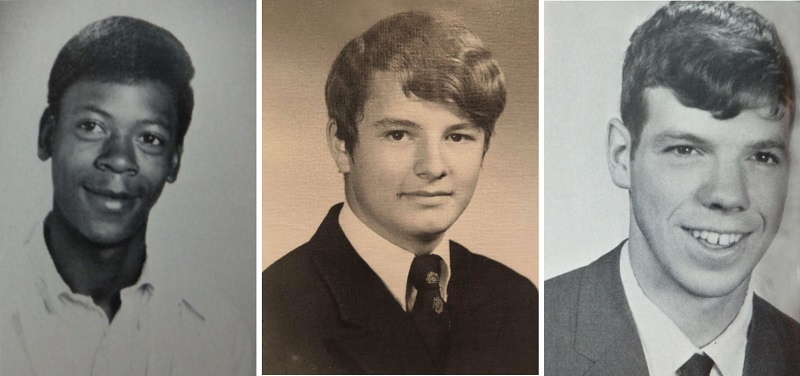
Jim Malone attended Indiana’s Anderson University where he continued to play football. By 1976 he had returned to Mt Sterling and found work at WMST and the Advocate newspaper. Malone made another stab at music during the 80s with Ray Purvis and Jerry Hatton (both previously in local bands the 25th Hour and Network), Mitch Crane, Tony Douthitt and others, but there was a lack of commitment and no gigs ever materialized. He moved on to work for the Louisville Courier-Journal before ultimately settling in western Kentucky where he continues to do investigative research for a law firm. Update: James Martin Malone passed away December 19, 2022 in Paducah at age 70 – sc
Ed Miller continued his football career at Georgetown College and upon graduation returned to take an accounting job in Mt Sterling before moving on to work the books at a coal company. His transfer to West Virginia coupled with the decline in the coal industry found him reinventing himself as a Certified Financial Planner and he remains in the Huntington area.
James Tripp found a second life on keys locally with another group of boys who resurrected the 25th Hour name. His co-songwriting credit can be found on the nice Trump single “It’s Called Life” from the group’s 1970 debut. Tripp attended law school and practiced in Mt Sterling before ending up in Ohio. Tripp passed away in 2009 at age 56.
Bob Unger attended UK briefly before being called for a military physical. Picking his own destiny, he joined the Navy but ultimately found himself in Vietnam anyway. After his four years, he settled in the Seattle area where he played for five or six years in the High Tide band with his then-wife. He returned to Mt Sterling briefly in ’83, but like Thomas Wolfe learned you can’t go home again. Unger again headed west and lives in Idaho.
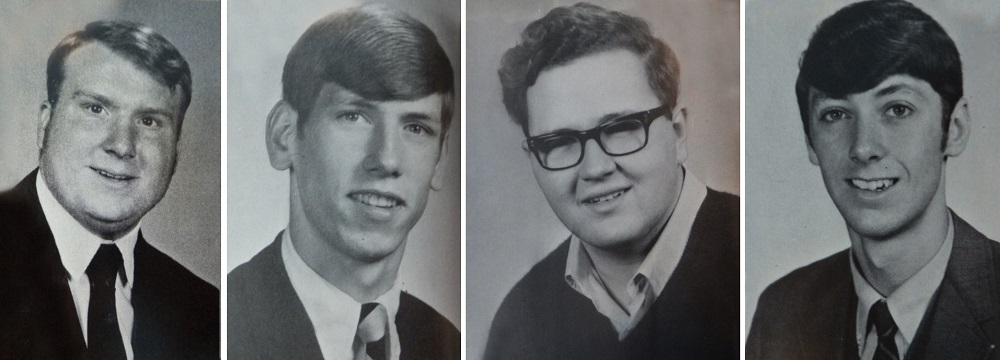
Discography:
BOSS 9922 Keep Your Woman / This Is The Thanks I Get 1969
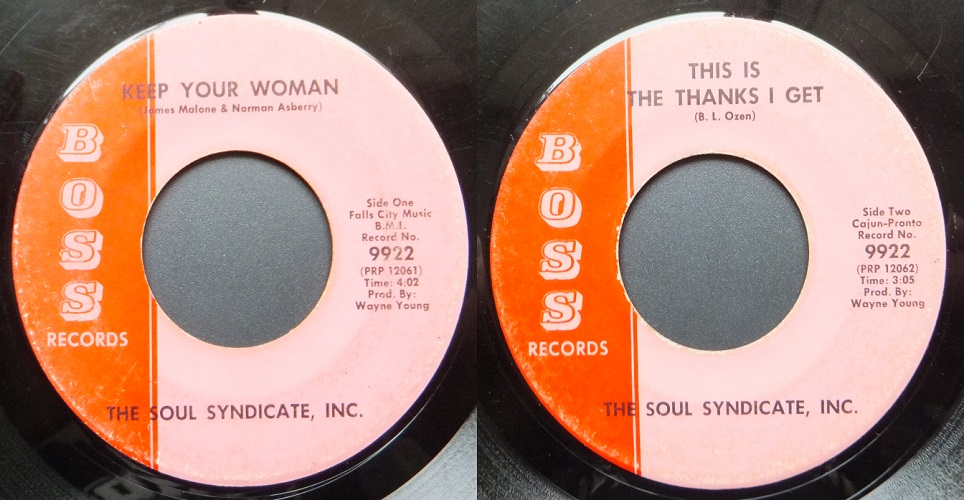
Great bunch of guys!
This is an amazingly well written article. Thanks for the walk down memory lane. I found myself being once again very proud of these persevering musicians. Wow – what vision they had. By the way, the barn they practiced in was next door to my house, making it easy to “attend” their gigs. Thanks again for bringing the Soul Syndicate Inc. back to the hearts of many classmates.
Oh yeah, we were all watching the front door of your house to see if you were home…I think we all had crush on one certain cheerleader! And we also kept an eye watching out for your dad to tell us to hold it down a bit and your Mom would take our side and just smile at us giving us the signal to keep practicing but maybe tune it down a notch. They both were saints to put up with us.
Never knew the history of the Soul Syndicate Inc until today…Wow…Nice write up of them. I so enjoyed their music, and I think I still have their record. Have a few 45’s stashed away. Thank you for telling us the whole story. I wondered what happened to everyone in the band. Now I know..Thank you!
I idolized my older brother’s band. I sat in on 1 rehearsal playing keys (poorly) for James Tripp. The guys weren’t impressed! The inspiration eventually led to a group of middle school boys starting the Dry Ice. It was a lot of fun and we were actually really good (for our age) as most of us were in high school band. Three of us became professional musicians. We always looked at Soul Syndicate, Inc as the band to emulate. After a fifty year hiatus we reunited with mostly old members add were booking gigs when Covid temporarily shut that door. This article is fantastic and brought back such good memories.
Hey David, appreciate the comment. I love those pics of Dry Ice and Sandra K. told me about the 50th reunion, which I bet was a blast. You guys were right there in the thick of the ‘Sterling scene! – Shawn
Norman Asberry is my father. I’m the middle child Anickia Asberry and yes my baby sister sings Like our father. My father still played in a band when I was younger. He had a passion for music and was very gifted. This article brought so much joy into my life. We miss our father so much. I love the pictures of him and the great things stated about my father. I appreciate this from bottom of my heart. Thank you!